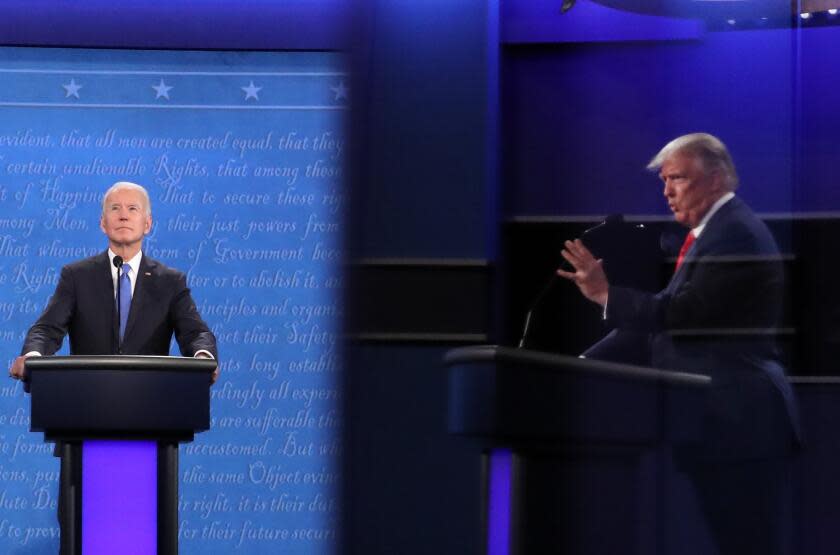Opinion: Biden and Trump will talk big at the debate, but how much could either really do?

A new phase of this election season will begin on Thursday when President Biden and former President Trump face off, and the blame game is certain to be part of the spectacle. Presidents are faulted for just about everything that happens during their term. But they are not really responsible for as many things as voters, journalists or political opponents try to blame them for.
The public demands action, and candidates promise it, but the presidency is an impossible office. It combines outsized expectations — which presidents themselves have embraced by campaigning as the voice of the whole country — with highlyconstrainedpolitical power in a system distinguished, currently, by gridlock. Neither Biden nor Trump would likely take office in January with a majority in the House and a filibuster-proof majority in the Senate. And the public pays little attention to the area where presidents have the most direct authority: foreign affairs.
Instead, at the debates, both candidates are likely to speak of their economic records and make promises about what they would do in a second term. But the economy is a complicated picture. Unemployment is low, the stock market is doing well, and inflation may be under control. Consumer confidence is on the rise, but that shift has not translated to a more favorable view of Biden. That may be because grocery prices have not fallen, and so higher prices are on voters’ minds. According to Gallup polling, the high cost of living is far and away Americans’ most pressing financial concern.
Voters tend to blame the incumbent president and his party for economic troubles. Credit for the good times doesn’t always flow the same way. Shouldn’t history tell us whether presidents are responsible for the direction of the economy? While some studies have found that the economy performs better under Democratic administrations, one study concluded that the partisan differences in economic performance did not stem from different policy approaches but rather from factors such as oil shocks, growth of defense spending and stronger economic growth abroad.
A decade ago, a colleague and I found that gasoline prices, home foreclosure rates and local unemployment levels in a voter’s community were influential in shaping their perceptions of the national economy, which in turn affects voting for president. Factors like local unemployment, federal spending in one’s community and federal responsiveness in the aftermath of a natural disaster drive support for incumbent presidents in affected communities.
This research helps explain why Americans may not broadly agree about how well the nation is doing — and whether Biden should be blamed or credited for the economy’s direction. Partisan polarization also leads some voters to set aside their own knowledge and experience and blame the president, or a candidate, for almost anything.
Voters also change their views of presidents because of events well beyond a president’s control — such as when a local college football or basketball team wins a game right before an election, or even the occurrence of a natural disaster. One study even found evidence that voters blamed President Wilson for shark attacks off the coast of New Jersey in 1916.
Here’s another thing presidents can’t control: the weather. In 2012, Superstorm Sandy hit the East Coast in late October as the presidential campaigns were in their final sprint. The storm gave incumbent President Obama the chance to be seen coordinating the federal response, comforting the affected communities, and meeting with Republican and Democratic leaders. Some research shows that Obama received votes based on his response to Sandy.
Presidents can’t control natural disasters, but they do decide how to respond — sometimes demonstrating leadership and even bipartisan cooperation. Such responses can reveal information about the quality of an elected official and potentially influence votes.
The election could be influenced more by a random act of Mother Nature in the fall than by a debate performance in June.
Andrew Reeves is a professor of political science and director of the Weidenbaum Center on the Economy, Government, and Public Policy at Washington University in St. Louis. This article was produced in partnership with the Conversation.
This story originally appeared in Los Angeles Times.
